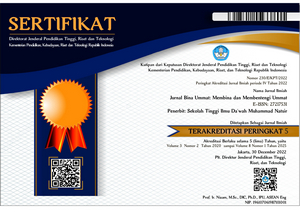PENDEKATAN APPRECIATIVE INQUIRY DALAM STRATEGI DAKWAH MOHAMMAD NATSIR: SUATU KAJIAN KONSEPTUAL DAN HISTORIS
DOI:
https://doi.org/10.38214/jurnalbinaummatstidnatsir.v8i1.326Abstract
ABSTRAK
Penelitian ini bertujuan untuk mengkaji strategi dakwah Mohammad Natsir secara konseptual dan historis dengan pendekatan Appreciative Inquiry (AI). Dengan menggunakan metode studi pustaka, penelitian ini menelaah karya-karya tulis Mohammad Natsir, dokumentasi sejarah, serta literatur yang berkaitan dengan teori Appreciative Inquiry dan praktik dakwah Islam. Hasil kajian menunjukkan bahwa strategi dakwah Natsir banyak mengedepankan nilai-nilai positif seperti dialog konstruktif, penghargaan terhadap keberagaman, dan penekanan pada etika serta moralitas Islam yang universal. Nilai-nilai tersebut sejalan dengan prinsip-prinsip utama AI seperti discovery, dream, design, dan destiny. Temuan ini memperlihatkan bahwa pendekatan dakwah Natsir tidak hanya bersifat ideologis, tetapi juga mengandung unsur metodologis yang adaptif dan humanis. Kajian ini diharapkan dapat memperkaya wacana metodologi dakwah kontemporer dan memberikan inspirasi dalam membangun strategi dakwah yang lebih inklusif dan transformatif..
Kata kunci : dawah; Mohammad Natsir; Appreciative Inquiry.
Published
Issue
Section
This work is licensed under a Lisensi Creative Commons Atribusi 4.0 Internasional.
Authors who publish with this journal agree to the following terms:
- Authors retain copyright and grant the journal right of first publication with the work simultaneously licensed under a�Creative Commons Attribution License that allows others to share the work with an acknowledgment of the work's authorship and initial publication in this journal.
- Authors are able to enter into separate, additional contractual arrangements for the non-exclusive distribution of the journal's published version of the work (e.g., post it to an institutional repository or publish it in a book), with an acknowledgment of its initial publication in this journal.
- Authors are permitted and encouraged to post their work online (e.g., in institutional repositories or on their website) prior to and during the submission process, as it can lead to productive exchanges, as well as earlier and greater citation of published work (See�The Effect of Open Access).



